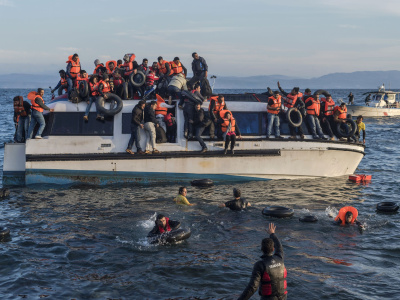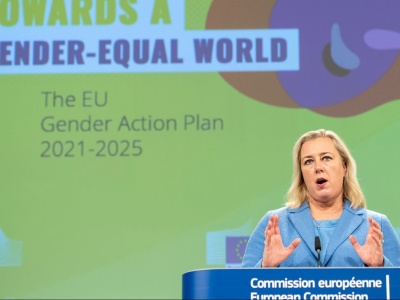
Wanted: A new alliance to defend the neighbourhood and the world in the next EU budget
On 14 June, the European Commission published its detailed proposals for the ‘Neighbourhood & the World’ heading of the next EU budget. This part of the EU budget, also known as Heading VI, covers the majority of European spending beyond its borders. The Commission proposed €123 billion for the heading, yet it will take a robust defence and a new collective alliance to protect this part of the budget from cuts in the upcoming negotiations.
The interest groups concerned by Heading VI have expanded over time, as EU external action embraces a wider agenda (including development, human rights, neighbourhood, peacebuilding, and foreign policy and security fields). Their first reaction is to ask: “How much for what?” They are pouring over the proposal to see which figures are given for which programmes, and how this will be administered.
The second reflex is usually to mount a robust defence of why their particular issue or part of the world needs more and why it needs to be defended from cuts. This is a natural reaction, particularly in a fast-changing world and because these will be difficult budget negotiations overall. But is it strategic? And is it likely to be successful in achieving a positive outcome for external action overall?
Heading VI is worth fighting for
The Commission came forward with a bold proposal that brings a significant amount of change.
While there are public complaints that the financial amount is not enough, behind closed doors most communities are actually quite positive – particularly in the wake of Brexit. Yet, the €123 billion for Heading VI is very far from a done deal. Unless a fairly united front can be presented, maintained and defended, the heading is likely to take a beating in the negotiations… as past negotiations would tell.
There is a distinct danger that rather than ensuring a collective alliance, the different external action communities will seek to protect their part of the pie. This would make Heading VI vulnerable to cuts, as communities in other headings such as Cohesion, Agriculture, or Research, seem a lot more organised and cohesive to financially bolster and protect their respective areas.
A more strategic approach to external action?
The Commission proposes to merge several external instruments into a broad Neighbourhood, Development and International Cooperation Instrument (NDICI). This is a significant change in the way that the EU engages with the rest of the world. While trailed for over a year, the confirmation of the NDICI has still shocked some.
In an atmosphere of low trust and change, the reaction of some groups within member states, the European Parliament, civil society and, ironically, parts of the Commission itself has been: “We need to retain our own separate external financial instrument” – even before engaging in a wider strategic discussion, or trying to mount a collective response in defence of Heading VI overall.
The thinking behind those in favour of maintaining the status quo is that a specific individual external financial instrument conveys both a higher status and protection. This view is understandable, but is it strategic? Is it evidence-based? And is it likely to get a positive result overall?
The Commission evaluated the key external financing instruments now in place. The resulting ‘Coherence report’ summarised the findings. It clearly revealed that the existing financial instruments would not be fit for purpose after 2021, with silos inhibiting collective action and greater impact.
A ‘back to the future’ scenario, where existing instruments are broadly retained because individual groups have fought for them, would therefore seem to be at best a missed opportunity, and at worst a strategic blunder born of vested interests.
While the Coherence report concluded that more agility and flexibility is required, it also cautioned against the securitisation of cooperation and the use of funds for addressing migration flows, and pointed out that the EU’s values agenda has been somewhat diluted. These are legitimate concerns, held by many.
The need for collective action to protect Heading VI
Indeed, the fact that foreign policy and international affairs are back on the ‘top table’ of EU decision-making because of instability and migration is a mixed blessing.
On one level, it makes arguing for more spending in this area easier – as the Commission is doing by proposing to increase the envelope for European external action by 13%, to €123 billion.
On another level, it places the EU’s short-term political interests more squarely on the agenda. This may negatively impact long-term results across a whole range of areas, whether they be development, human rights, or peace and stability.
Trust is a significant issue in moving forward to confront this. The relations between the main players, the different member states, the Commission, the Parliament, the European External Action Service, and civil society and lobby groups has been characterised by a high degree of mistrust. This is likely to work against a united alliance to protect Heading VI, unless it can be tackled and met head on, without anyone being too defensive, and everyone being respectful of each other’s positions and hearing each other out.
The Commission wants more flexibility and a larger budget – and it is right to ask for it, in order to act more strategically as a global player.
The Parliament has been sidelined and feels rightly aggrieved that its views aren’t taken seriously. New ways would need to be thought of to give the Parliament a similar level of accountability over a reduced number of instruments. The member states are concerned about the effective use of ‘their money’, and their heads of government want action on international affairs issues that are raising political attention at home.
Finally, civil society is right to be concerned about EU values and international commitments being diluted, just as think tanks are rightly critical of the lack of strategic approaches and the poor use of evidence in policy-making and initiatives.
All actors involved have a high degree of vested as well as legitimate interests. Everyone agrees on the fact that consolidation and flexibility are necessary… but not with their instrument or issue, which they think deserves special treatment.
The EU is built on rules and laws, and what most people want to see are safeguards that help preserve their areas of work. If that happens without a wider strategic discussion or collective action to defend heading VI, it will likely lead to an outcome that rather than protecting issues makes them more vulnerable.
The safeguards and governance of the single instrument will need more detail and more work if it is to gain collective trust, but for that a better, more evidence-based dialogue is needed. Building trust should start by ensuring that resources are used in a transparent and effective manner.
What type of upstream political steering and priority setting with member-state involvement can the Commission propose to reassure stakeholders that this will be the case? Could the Commission speed up its reporting on implementation to member states and the Parliament to reassure stakeholders on accountability? Or could it do more and be more open about the monitoring data it has? Could external evaluations be given more independence, prominence and consequence? And could a role for oversight have more consequence without slowing down implementation?
ECDPM will promote debate amongst the different communities interested in Heading VI and will provide analytical reflection. If you or your organisation are interested in being part of this open debate about strategy, interests and values beyond positioning, we would be interested in hearing from you. You can get in touch with Andrew Sherriff, Mariella Di Ciommo, Meritxell Sayós Monràs or Alexei Jones.
The views are those of the authors and not necessarily those of ECDPM.





